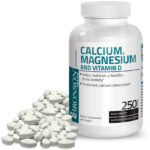Cal Mag: Uses, Dosage, Side Effects, Overdose

Cal Mag (Calcium carbonate and magnesium hydroxide) is a combination antacid used to treat indigestion, upset stomach, and heartburn. Calcium carbonate and magnesium hydroxide may also be used for purposes not listed in this medication guide.
Just about everybody at one time or another will get a bellyache. Most causes of abdominal pain aren’t reasons to worry, and your doctor can easily diagnose and treat the problem. Sometimes, though, it can be a sign of a serious illness that needs medical attention.
What should I discuss with my healthcare provider before taking calcium carbonate and magnesium hydroxide?
- You should not use this medicine if you have ever had an allergic reaction to an antacid.
- Ask a doctor or pharmacist if it is safe for you to take this medicine if you have kidney disease.
- Ask a doctor before using this medicine if you are pregnant or breast-feeding. Your dose needs may be different during pregnancy or while you are nursing.
- Do not give this medicine to a child without medical advice.
How should I take calcium carbonate and magnesium hydroxide?
This medication is usually taken between meals or at bedtime. Follow the instructions on the medicine label. Do not use the medication in larger amounts or more often than recommended.
The chewable tablet must be chewed before you swallow it.
Shake the oral suspension (liquid) well just before you measure a dose. Measure liquid medicine with the dosing syringe provided, or with a special dose-measuring spoon or medicine cup. If you do not have a dose-measuring device, ask your pharmacist for one.
Do not take calcium carbonate and magnesium hydroxide for longer than 14 days in a row without medical advice.
Call your doctor if your symptoms do not improve, or if they get worse after 2 weeks of using calcium carbonate and magnesium hydroxide.
Store at room temperature away from moisture and heat. Do not allow the liquid medicine to freeze.
What happens if I miss a dose?
Since antacids are used when needed, you may not be on a dosing schedule. If you are on a schedule, use the missed dose as soon as you remember. Skip the missed dose if it is almost time for your next scheduled dose. Do not use extra medicine to make up the missed dose.
What happens if I overdose?
Calcium carbonate with magnesium overdose occurs when someone takes more than the normal or recommended amount of medicine that contains these ingredients. The overdose may be by accident or on purpose.
If you or someone you are with overdoses, call your local emergency number (such as 911), or your local poison control center can be reached directly by calling the national toll-free Poison Help hotline (1-800-222-1222) from anywhere in the United States.
Calcium carbonate with magnesium is found in many (but not all) antacids, including the following brands:
• Maalox
• Mylanta
• Rolaids
• Tums
Other antacids may also contain calcium carbonate and magnesium.
Symptoms
Symptoms of an overdose of calcium carbonate and magnesium include:
• Bone pain (from chronic overuse)
• Constipation
• Decreased reflexes
• Diarrhea
• Dry mouth
• Irregular heartbeat
• Poor balance
• Shallow, rapid breathing
• Skin flushing
• Stupor (lack of alertness).
What should I avoid while taking calcium carbonate and magnesium hydroxide?
Avoid taking other medications at the same time you take an antacid. Some antacids can make it harder for your body to absorb certain drugs, making them less effective. Take your other medications at least 2 hours before or 2 hours after you take calcium carbonate and magnesium hydroxide.
What are the possible side effects of calcium carbonate and magnesium hydroxide?
Get emergency medical help if you have signs of an allergic reaction: hives; difficult breathing; swelling of your face, lips, tongue, or throat.
Stop using this medicine and call your doctor at once if you have symptoms of high calcium or magnesium levels in your blood:
• nausea, vomiting, constipation;
• increased thirst or urination;
• muscle weakness, bone pain;
• confusion, weakness, feeling tired;
• trouble breathing; or
• slow heart rate, feeling light-headed.
Common side effects may include:
• diarrhea;
• constipation; or
• upset stomach.
This is not a complete list of side effects and others may occur. Call your doctor for medical advice about side effects. You may report side effects to FDA at 1-800-FDA-1088.





